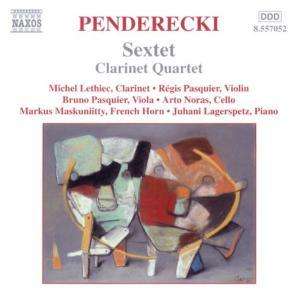Krzysztof Penderecki: Sextett für Klarinette,Horn,Violine,Viola,Cello & Klavier auf CD
Sextett für Klarinette,Horn,Violine,Viola,Cello & Klavier
Herkömmliche CD, die mit allen CD-Playern und Computerlaufwerken, aber auch mit den meisten SACD- oder Multiplayern abspielbar ist.
(soweit verfügbar beim Lieferanten)
+Klarinettenquartett; 5 Miniaturen für Klarinette & Klavier; Divertimento für Cello solo; Prelude für Klarinette solo
- Künstler:
- Lethiec, R.& B. Pasquier, Noras, Maskuniitty, Lagerspetz
- Label:
- Naxos
- Aufnahmejahr ca.:
- 2001
- Artikelnummer:
- 8237956
- UPC/EAN:
- 0747313205226
- Erscheinungstermin:
- 10.6.2003
Das Sextett (2000) für Klarinette, Horn, Violine, Viola, Violoncello und Klavier in zwei kontrastierenden Sätzen ist Pendereckis bisher umfangreichstes Kammermusikwerk. Der erste Satz beginnt zurückhaltend, da die anderen Instrumente über dem trampelnden Klavier eine Reihe von markanten Motiven mit einer schostakowitsch-ähnlichen ironischen Note einführen. Die Musik gewinnt an rhythmischem Schwung, zweimal wird sie von Cello und Horn mit einer expressiveren Idee unterbrochen, das zweite Mal führt sie zu einer Rückkehr der trampelnden Bewegung. Dadurch werden die Instrumente in eine furchteinflößende Wirbelbewegung versetzt, die das intensivste bisher gehörte instrumentale Zusammenspiel vorwegnimmt. Von hier aus treibt die Musik zu einem eindringlichen und entschiedenen Ende. Der zweite Satz beginnt mit sonorer, elegischer Musik für die Streicher über einem rhetorisch klingenden Klavier. Die Klarinette tritt mit einer sich abwickelnden Melodielinie ein, und die Musik legt sich in eine Stimmung nachdenklicher Melancholie, wobei Klarinette und Horn die Hauptlast der Melodieführung tragen. Die dramatische Intensität wird durch einige typisch Pendereckianische "schrittweise" chromatische Aufstiege beibehalten, während mehrere kurze, aber gezackte Höhepunkte die Stimmung des Bedauerns untergraben. Nach und nach wird der Ausdruck lebhafter und ironischer, wodurch die leidenschaftliche Threnodie des Cellos, die von der Bratsche und dann von der Klarinette aufgenommen wird, umso herzlicher wird. Von hier aus zieht sich die Musik in einen Abschluss von düsterer, ja träumerischer Intensität, die mit Erreichen der letzten Takte immer sparsamer und nach innen gerichtet wird.
Product Information
Written for clarinet, horn, violin, viola, cello and piano, the Sextet (2000), in two contrasting movements, is Penderecki’s most substantial chamber work to date. The first movement opens understatedly, as, over tramping piano, the other instruments introduce a number of salient motifs with a Shostakovich-like ironic tinge. The music gathers rhythmic momentum, twice interrupted by cello and horn with a more expressive idea, the second time leading to a return of the tramping motion. This draws the instruments into a fearsome whirling motion, presaging the most intensive instrumental interplay yet heard. From here, the music drives to a forceful and decisive ending. The second movement opens with sonorous, elegiac music for the strings over a rhetorical-sounding piano. The clarinet enters with an unwinding melody line, and the music settles into a mood of pensive melancholy, clarinet and horn carrying the brunt of the melodic writing. Dramatic intensity is maintained through some typically Pendereckian ‘stepwise’ chromatic ascents, while several brief but jagged climaxes undermine the mood of regret. Gradually the expression becomes more animated and ironic, making the cello’s impassioned threnody, taken up by viola and then clarinet, all the more heartfelt. From here the music draws itself out in a conclusion of sombre, even funereal intensity, becoming increasingly spare and inward as the final bars are reached.
Disk 1 von 1 (CD)
-
1 Sextet for Clarinet, Horn, Violin, Viola, Cello and Piano: Allegro moderato
-
2 Sextet for Clarinet, Horn, Violin, Viola, Cello and Piano: Larghetto
-
3 Clarinet Quartet: Notturno: Adagio
-
4 Clarinet Quartet: Scherzo: Vivacissimo
-
5 Clarinet Quartet: Serenade: Tempo di Valse
-
6 Clarinet Quartet: Abschied: Larghetto
-
7 3 Miniatures for Clarinet and Piano: Allegro
-
8 3 Miniatures for Clarinet and Piano: Andante cantabile
-
9 3 Miniatures for Clarinet and Piano: Allegro ma non troppo
-
10 Divertimento for Solo Cello: Sarabande
-
11 Divertimento for Solo Cello: Serenade
-
12 Divertimento for Solo Cello: Scherzo
-
13 Divertimento for Solo Cello: Notturno
-
14 Preludium: Prelude for Solo Clarinet
Mehr von Krzysztof Pende...
-
Krzysztof PendereckiCellokonzert Nr.2CDAktueller Preis: EUR 19,99
-
Elina Vähälä & Niek de Groot - Duos für Violine & KontrabassCDAktueller Preis: EUR 19,99
-
Ernst KrenekSerenade op.4 für Klarinette,Violine,Viola,CelloCDAktueller Preis: EUR 16,99
-
Krzysztof PendereckiSymphonie Nr.3CDVorheriger Preis EUR 14,99, reduziert um 0%Aktueller Preis: EUR 6,99






